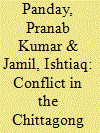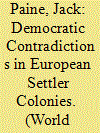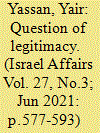| Srl | Item |
| 1 |
ID:
139247


|
|
|
|
|
| Summary/Abstract |
The settlers constitute a minority group whose goals are becoming increasingly unpopular among Israelis. As a result, the degree of legitimacy granted to them by the government gradually eroded over the years. However, their project still thrives. Their impressive success can be attributed to their focus on the bureaucracy. As early as the 1960s, the settlers engaged in a constant effort to identify actors in state and semi-state agencies that had common interests with them. At first they mobilized supporters from within those agencies. Later they made any effort to fill available positions with their own people. Today, the settlers' movement in Israel has fused itself with the relevant elements within the bureaucracy to a degree that many state agencies serve as extensions of the settler movement.
|
|
|
|
|
|
|
|
|
|
|
|
|
|
|
|
| 2 |
ID:
093189


|
|
|
| 3 |
ID:
180259


|
|
|
|
|
| Summary/Abstract |
Despite the proliferation of literature on large-scale land acquisitions (LSLA) in Africa, few empirical studies exist on how patronage networks combine with socio-cultural stratification to determine the livelihood outcomes for African agrarian-based communities. This article draws from ethnographic research on Cameroon to contribute to bridging this gap. We argue that lineage and patronage considerations intersect to determine beneficiaries and losers during LSLA. Second, we show that LSLA tend to re-entrench existing inequalities in power relations that exist within communities in favour of people with traceable ancestral lineage. Concomitantly, non-indigenous groups especially migrants, bear the brunt of exclusion and are unfortunately exposed to severe livelihood stresses due to their inability to leverage patronage networks and political power to defend their interests. We submit that empirical examination of the impacts of land acquisitions should consider the centrality of power and patronage networks between indigenes and non-indigenes, and how this socio-cultural dichotomy restricts and/or mediates land acquisition outcomes in Cameroon.
|
|
|
|
|
|
|
|
|
|
|
|
|
|
|
|
| 4 |
ID:
167980


|
|
|
|
|
| Summary/Abstract |
How did political institutions emerge and evolve under colonial rule? This article studies a key colonial actor and establishes core democratic contradictions in European settler colonies. Although European settlers’ strong organizational position enabled them to demand representative political institutions, the first hypothesis qualifies their impulse for electoral representation by positing the importance of a metropole with a representative tradition. Analyzing new data on colonial legislatures in 144 colonies between the seventeenth and twentieth centuries shows that only British settler colonies—emanating from a metropole with representative institutions—systematically exhibited early elected legislative representation. The second hypothesis highlights a core democratic contradiction in colonies that established early representative institutions. Applying class-based democratization theories predicts perverse institutional evolution—resisted enfranchisement and contestation backsliding—because sizable European settler minorities usually composed an entrenched landed class. Evidence on voting restrictions and on legislature disbandment from Africa, the British Caribbean, and the US South supports these implications and rejects the Dahlian path from competitive oligarchy to full democracy.
|
|
|
|
|
|
|
|
|
|
|
|
|
|
|
|
| 5 |
ID:
178312


|
|
|
|
|
| Summary/Abstract |
Many members of minority groups clash violently with state agents. The case of West Bank rightwing activists is particularly paradoxical. Unlike disempowered groups whose ability to bring about change is limited, these activists constitute a powerful sociopolitical force, and the security forces with which they clash also protect them in the territories to which they claim sovereignty. Based on 20 interviews with rightwing protest activists, this article explores what interpretation activists give to their part in violent clashes. The article offers two main contributions. First, it proposes the concept of perceived state legitimacy as a theoretical construct for evaluating the degree to which citizens view their state as legitimate. Unlike previous studies that define legitimacy as a unidimensional construct, perceived state legitimacy is defined here as made up of five different components: identification, trust, distributive justice, procedural justice, and legality. Second, the article shows empirically that violent clashes can indicate undermining distinct components of state legitimacy. Thus, West Bank rightwing activists who took part in violent clashes with state agents undermine the state’s legitimacy components of trust, distributive justice, procedural justice, and legality – but not identification.
|
|
|
|
|
|
|
|
|
|
|
|
|
|
|
|